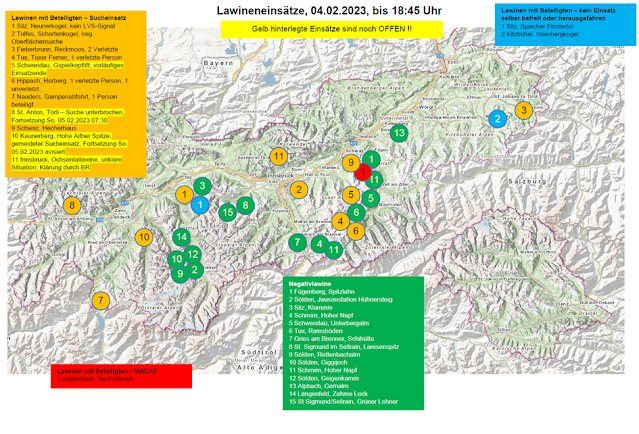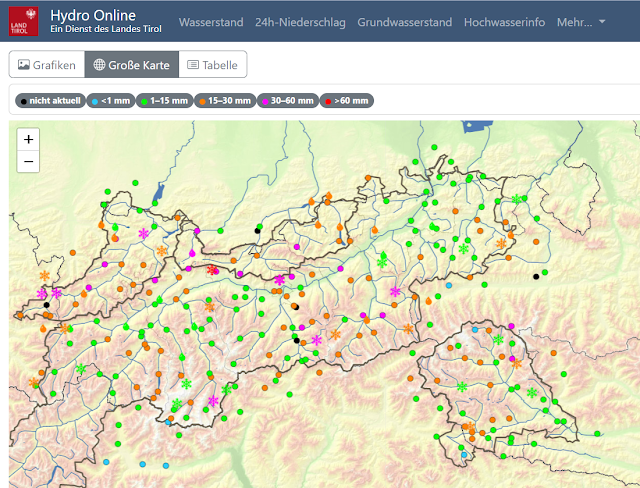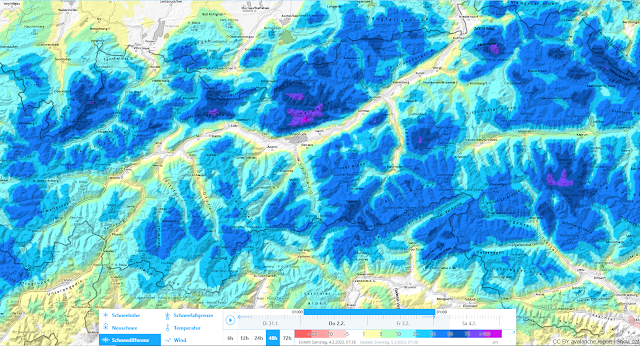Numerous avalanches involving persons
We are facing an extraordinary and dangerous situation for winter sports enthusiasts, with high avalanche danger above 1600 m. Confirmation of this during the last two days came from numerous avalanches in which persons were involved. This morning (04.02) there were 29 reports made to headquarters in Tirol. Yesterday (03.02) there were 10 reports. On 03.02 a person died in an avalanche in Königstal in the Gurgler Massif. Today on 04.02 a youth was killed in the region of the Neuhütten Lift near Kalterbach. In two further avalanche accidents (Törli - St. Anton; Hoher Aifner - Kaunerberg) there are 3 persons missing.
 |
| Overview of avalanches reported to headquarters Tirol. Yesterday on 03.02 there were an additional 10 avalanches. (c) Landeswarnzentrale Tirol |
Numerous naturally triggered avalanches
The high proneness to triggering of the snowpack was demonstrated by numerous naturally triggered avalanches. These were medium, large and in isolated cases also very large avalanches. The biggest ones triggered at very high altitudes particularly in leeward ridgeline zones. The crucial factor in these releases was not only the high additional weight on the snowpack due to fresh snow and snowdrifts in huge masses but also today’s solar radiation.
Successful artificial triggerings throughout the land
We were also informed that artificial triggerings in the major areas of precipitation were highly successful.
Cluster risk in open terrain
High danger means there are a bevy of avalanche prone locations inside one single region where avalanches can easily be triggered. However, only through the presence of winter sports enthusiasts in the endangered zone does a danger turn into a risk. This risk is currently quite high, since many winter sports enthusiasts are out in open terrain. That is partly because it is a weekend, partly because the beautiful weather is a temptation, and partly because winter vacation just began in some states. This cluster risk can be reduced only if there are fewer winter sports enthusiasts out in backcountry, i.e. if more of them remain on secured ski pistes or if those who are in outlying terrain possess a great deal of knowledge and experience and also exercise immense restraint.
Interesting comparison
Exactly one year ago we were in a similar situation. In a period of just two days, 8 people lost their lives in avalanches. Further details can be seen here:
Our repeated plea
Current conditions in backcountry terrain are treacherous. Above 1600 m they are dangerous. Inexperienced persons should under no circumstances leave secured ski areas. In backcountry terrain an immense amount of experience and highly disciplined restraint are imperative. Please also note: in some places avalanches can still be triggered remotely in flat terrain.
Here are a few snapshots and impressions of the current situation
 |
| 24-hr precipitation distribution, 2-3 February, 8:00 am |
 |
| 24-hr precipitation distribution, 3-4 February, 10:00 am. Rainfall mostly up to 1100-1400m. |
 |
| 48-hr difference in snow depths, 2-3 February |
.jpg) |
| Avalanche Reckmoos near Fieberbrunn. One person was injured. (photo: Markus Kogler, 03.02.2023) |
%20(Large).jpg) |
| Frequently observed: hillside snowslides near and below treeline (photo: Tobias Holzknecht, 04.02.2023) |
.jpg) |
| This very large avalanche was artificially triggered on the Hoher Mut in the Gurgler Massif. (photo: Hugo Reindl, 04.02.2023) |
%20(Large).jpg) |
| Avalanche in Villgratental on the way to Gaishörndl (photo: Daniel Rogger, 03.02.2023) |
.jpg) |
| Due to rain impact, increasing glide-snow on steep grass-covered slopes (photo: Franz Josef 04.02.2023) |
Outlook
Following a brief perturbance which will brush us tomorrow afternoon (05.02), weather conditions starting next week are expected to improve. A brilliant bit of winter weather awaits us. Avalanche danger will incrementally recede. Due to solar radiation and nocturnal longwave outgoing radiation, the situation on steep south-facing slopes should get better more quickly than in other aspects.